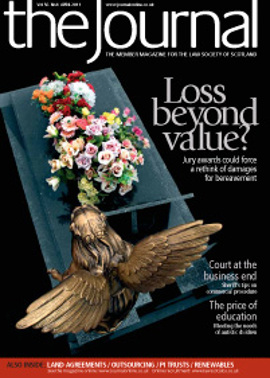Coming out - on top

Addressing Stonewall’s “Coming Out for Equality” conference in November, Frank Mulholland QC, Scotland’s Solicitor General, explained exactly what hate crime legislation means for employers, including the recently implemented Offences (Aggravation by Prejudice) (Scotland) Act 2009.
This wide-ranging Act provides that all offences may now be aggravated by prejudice relating to disability, sexual orientation, or transgender identity, giving the same consideration to these forms of aggravation as is already given to religious and racial intolerance. Mr Mulholland noted: “There are an infinite number of potential breaches of the legislation and employers have to be vigilant and constantly examine and update policies and practices to guard against this.”
He went on to say: “Forms of hate which are ignored, tolerated or promoted in the workplace leave an employer open to civil and criminal sanctions”, before pointing out the potential costs in reputational damage and financial penalty.
These risks are reason enough to ensure your workplace is diverse and inclusive to people from all walks of life. However, embracing diversity also benefits your business in lots of ways, including staff productivity, recruitment and retention.
Concealing one’s sexual orientation at work reduces productivity; Stonewall research shows that people perform better when they can be themselves. Employees need to be able to communicate and build supportive, co-operative relationships with colleagues and clients (“Peak Performance”, Stonewall, 2008). Businesses clearly marketing their products, services and themselves as employers to lesbian, gay and bisexual (LGB) people benefit from being able to recruit and retain the best people from the widest pool of talent.
Becoming a Stonewall Diversity Champion and competing for a place in our Workplace Equality Index (WEI) are both extremely effective ways to send the signal that gay people not only exist within your business but that they are valued, included and welcomed. The WEI is free to all employers to enter and is the definitive national benchmarking exercise showcasing Britain’s top employers for LGB staff. Members of the programme also appear in our recruitment guide, reaching the next generation of employees and career switchers.
Networking with clients on diversity initiatives and events – which may currently be a factor in your CSR strategy – also promotes this message and can strengthen client relations and bring in new business. The public sector procurement market is worth 15% of GDP or £220 billion (HM Treasury, 2010). The Equality Act requires private sector companies to demonstrate their diversity credentials in winning public sector contracts.
Lesbian, gay and bisexual consumers are a powerful, lucrative but oft-overlooked market, estimated to be worth between £70-81 billion in Britain. Polling evidence from YouGov has shown that they, their friends and family are more likely to buy a product or service from a gay-friendly company.
These commercial benefits have been widely recognised by the legal sector in England, where there are currently 46 legal Diversity Champions. We now have a specific English legal sector top 10 of LGB-friendly employers, and seven of the whole top 100 are legal firms. This includes Baker & McKenzie LLP, who received the Most Improved Employer award for their awareness-raising initiatives for staff, policy changes, and engagement with the wider LGB community, boosting both their reputation and their brand.
Jenny Barrow, the firm’s head of diversity & CSR, said: “Not only does [the award] reflect the work we have done in this area over a number of years, it is also a result of the outstanding contribution of our BakerLGBT network members. Our continued participation in the Stonewall Workplace Equality Index has helped us maintain our focus on progressing in this area as well as providing an auditing tool that is relevant to all diversity strands.”
But in Scotland there is no such competition from top performing legal organisations. In fact, no Scottish legal firms are members of the Diversity Champion programme or take part in the WEI. Frank Mulholland said: “It is for all of us to create a culture of respect, not just because it is the right thing to do but because, as employers, it benefits our business.” The business case has been recognised down south – when will Scotland’s legal sector follow?
In this issue
- Civil legal aid in the supreme courts
- Ever-eventful year
- Coming out - on top
- In the awards
- The price of grief
- Commercially driven
- Autism and the good society
- Guardians of the PIT
- Arbitration outreach
- The cloud? It's down to earth...
- Searching for a constitution
- Complaints update: disclosing information
- Dean waives cab rank rule in civil legal aid cases
- Law reform update
- The learning curve
- Legal services outsourcing: don't miss the boat
- Ask Ash
- The right steer
- No second chance
- Burning a hole in the law
- Protecting the prescribed part
- Final brick in place
- Scottish Solicitors' Discipline Tribunal
- Website review
- Book reviews
- Stretching the public purse
- Land and the open market
- Easing the burdens?
- It's an ill wind...






